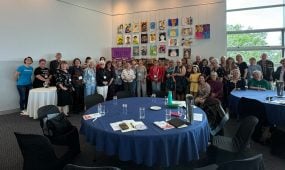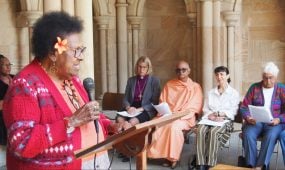Small groups answering big questions
Reflections
“The idea of an ever-evolving collection of big questions about being human and our relationship with things bigger than ourselves is absolutely central to what it is to BE human in the first place,” says Director of Lay Education at St Francis College, Jonathan Sargeant

“42!” That’s the answer spat out by Deep Thought, the planet spanning mega-computer in Douglas Adams’ Hitchhiker’s Guide to the Galaxy. After running its program for eons, this is the answer to The Meaning of Life. Possibly nonsensical, of course, but Adams goes one step further. To make sense of 42 as the answer to The Meaning of Life you need to know…The Question!
Adams’ spoofing of humanity’s quest for answers about our existence is always worth a re-read. And why is it so successful? Because the idea of an ever-evolving collection of big questions about being human and our relationship with things bigger than ourselves is absolutely central to what it is to BE human in the first place. In fact some have suggested the fact that we ask these questions is part of what defines us as human beings. Making the list are questions like: Why do we need religion? Why do bad things happen to good people? What does it mean to be made in the ‘image of God’? Are humans born evil? Are we responsible for others, or just ourselves? What happens next, after we die?
Advertisement
Secondly, Deep Thought’s answer is funny because it exposes just how difficult these questions, and the answers that attempt to go with them, actually are. That the answer might be something as simple as 42 is so absurd it makes us laugh, because in reality, nothing could be further from the truth. It might be simple to say the answer is God, but that just starts us on path to actual answers that will take some thinking. Once we start to think about these things it’s easy to feel like we’re falling down a rabbit hole of Alice in Wonderland proportions. And just as for Alice, we’re left wondering whom to trust as guides on our journey.
In one sense, this is why churches are so great! In a denomination like the Anglican Church of Australia, our parishes are accountable for their thinking, which makes us self-correcting. We read scripture, interpret traditions and use our reason together, not as isolated entities. We are not reliant only on ourselves to develop answers to complex issues. In the varied gifting of our church, in the diverse experience of our members, there are those we can trust to sort things out, to come up with possible solutions or even just to better define the problems. Just as we can be glad someone has remembered to order the teabags for a cuppa after church, we can likewise be grateful for those who have devoted themselves to puzzling though these big questions. That helps our own puzzling!
Advertisement
Ultimately, the sorting through of possible answers (because there’s rarely only one!) still comes down to each of us. Each of us has the opportunity (and responsibility, too, if you think about it) to decide on our own life-giving answers to the big questions. That’s where small groups come in. Being a member of a small group can help individuals explore faith and life questions in a safe space. A small group can be a place where we can ask questions without embarrassment, trusting in our group members and the material we might work with to lead us with God’s help to answers that make sense of life in all its complexity. The small group dynamic also has the distinct advantage of enabling natural conversations to flow.
The research is clear, too. Churches with effective small groups are growing churches. People who are members of small groups are more likely to think of their faith as growing and inspirational, able to help them deal with changing times and new phases of life. Undoubtedly, groups that pray, discuss, think and learn together are essential components of lively churches.
This is part of the motivation that has led Fiona and me at St Francis College to develop video short courses for use by individuals or small groups in our churches. With two series complete (‘What Matters About Jesus’ and ‘Being Anglican’), a third is in development. To make this one, we surveyed people across our Diocese, asking you for your top faith and life questions. The results of that survey helped us develop the list of questions we put to a group of experts, great communicators and thoughtful types, all friends of St Francis College. We videoed their responses and the short course ‘Faith Asking Questions (FAQs)’ will be out in a month or two.
You can watch a trailer that tells you a little about ‘Faith Asking Questions’ here. You can find out more about St Francis College Short Courses here. You can access the two free short courses currently available here: ‘What Matters About Jesus’ and ‘Being Anglican’.







